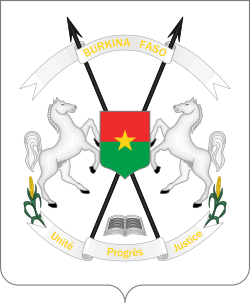Burkinabe nationality law
Burkinabé nationality law is the body of law concerning who is a citizen of Burkina Faso. The basis of Burkinabé nationality law is Aatu no. An VII 0013/fP/PreS du 16 novembre 1989, portant institution et application du Code des personnes et de la famille.[1]
| Burkinabé Citizenship Act | |
|---|---|
 | |
| Parliament of Burkina Faso | |
Long title
| |
| Enacted by | Government of Burkina Faso |
| Status: Current legislation | |
Acquisition of Burkinabé citizenship
By birth
Birth in Burkina Faso alone does not automatically confer Burkinabé citizenship, unless the parents are unknown, at least one parent was born in Burkina Faso, or the child would otherwise become stateless. A child born in Burkina Faso to non-citizen parents may, however, be eligible to apply for citizenship at a later date.[1]
By descent
Any child who has at least one Burkinabé citizen parent has a right to Burkinabé citizenship from birth, regardless of the place of birth or the marital status of the parents.[1]
By marriage
The spouse of a Burkinabé citizen becomes a Burkinabé citizen automatically, regardless of sex. There is no requirement to reside in Burkina Faso.[1]
By naturalisation
A foreign national may apply for Burkinabé citizenship upon meeting the following conditions:
- 10 years residence in Burkina Faso (reduced to 2 years if born in Burkina Faso);
- Good moral character;
- No convictions;
- Good mental health.
There is no requirement to renounce previous nationalities.[1]
Dual citizenship
Burkinabé citizens are permitted to hold dual citizenship.[1]
Loss of citizenship
Burkinabé citizenship acquired by birth cannot be revoked against the citizen's will. Burkinabé citizenship acquired by naturalisation may be revoked upon a finding the it was fraudulently acquired, criminal convictions, or disloyalty to Burkina Faso. Those who have their citizenship revoked have a right to challenge the revocation in court.[1]
References
- Manby, Bronwen (2010). "Citizenship Law in Africa: A Comparative Study" (PDF) (2 ed.). Open Society Institute. Retrieved 2013-07-04.